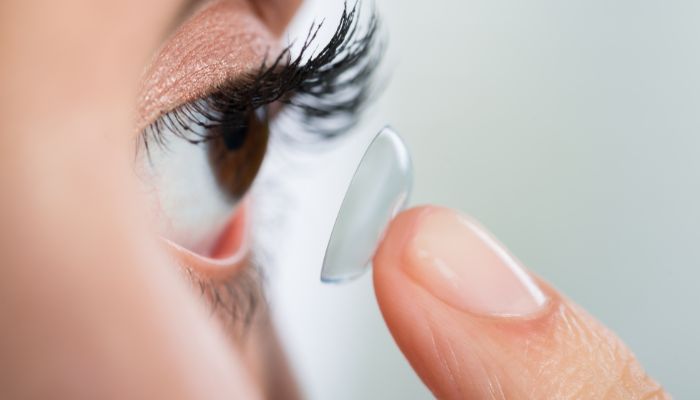Contact lenses does have some advantages over spectacles. The most notable advantages include: improved peripheral vision, no frames to obstruct vision, less noticeable than glasses, no slipping down the nose, no fogging up, and no glare from lights. Additionally, contact lenses can be easier to wear when participating in sports or other physical activities. Let us find out the disadvantage and advantages of contact lenses over spectacles.

Switching from glasses to contacts
When switching from spectacles to contacts, it is important to get a prescription from an eye doctor in order to get the proper fitting and prescription for the contacts. It is also important to discuss the care and maintenance of contact lenses with the doctor, as well as how to properly put them in and take them out. The doctor may provide a trial pair of contacts to make sure the fit is correct and comfortable. Once the correct prescription and fit is determined, the doctor can provide an order for the contacts.
What makes them popular ?
The popularity of contact lenses is largely due to their convenience and comfort. They also provide a natural appearance when worn, and are free from the aesthetic limitations of eyeglasses. Contact lenses are also more affordable than in the past, making them more accessible to a greater number of people. Additionally, advances in technology have allowed for contact lenses to be designed for specific vision needs, such as correcting astigmatism, bifocal vision, and color blindness.
Contact lenses advantages over Spectacles

- Contact lenses provide a wider field of vision. The lenses are placed directly on the eye so they don’t obstruct the view like glasses frames can.
- Contact lenses are more comfortable than glasses. They don’t slide down your nose, and they don’t leave marks on your nose or ears.
- Contact lenses are more convenient. You don’t have to worry about glasses slipping off or fogging up when you’re outdoors or in humid environments.
- Contact lenses are generally more aesthetically pleasing. They don’t obstruct your face, and they don’t make you look like you wear glasses.
- Contact lenses are much more durable than glasses. They can withstand more wear and tear, and they don’t break easily.
Contact lenses drawbacks over glasses
- Higher risk of infection: Contact lenses are more likely to cause eye infections than glasses, as they are inserted directly onto the eye and can be easily contaminated.
- Require more care and cleaning: Contact lenses require more maintenance and cleaning than glasses. They must be properly cleaned and stored in a contact lens solution at all times to prevent contamination.
- More expensive: Contact lenses are often more expensive than glasses due to the cost of the lenses and the solutions needed to clean and store them.
- Less protection from the elements: Contact lenses do not provide the same protection from the sun and wind as glasses do. They also do not protect the eyes from dust, dirt, and other particles.
- Dry eyes: Contact lenses can cause dry eyes and strain if they are not properly lubricated and if the eyes are not kept moist.
How often you need to wear them?

Apart from this you must also decide on the frequency of wearing contact lens. Weekly, monthly and even daily disposable contact lenses are available in the market. Choose one according to your need. If your eyes are sensitive go for at the most weekly disposable lenses to avoid any harmful affects. They are a little more expensive than the long lasting usage time. So take in to consideration your budget and too and choose wisely.
Types of Lenses
Your eye care professional (optometrist or ophthalmologist) will be able to provide you with the best advice as to which type of contact lenses are best suited for your specific vision needs. They will be able to discuss with you the various types of contact lenses available, and which ones would be the most beneficial for you.
- Soft Contact Lenses: These are the most popular and comfortable type of lenses. They are made of a flexible, water-retaining plastic material that conforms to the shape of your eye.
- Gas-Permeable Contact Lenses: These lenses are made of a rigid, durable material that allows oxygen to pass through to the cornea. They are more durable than soft lenses and offer better vision clarity.
- Extended Wear Contact Lenses: These lenses can be worn for up to 30 days without taking them out. They are made of a soft material that allows oxygen to reach the cornea.
- Disposable Contact Lenses: These lenses are designed to be discarded after a single use. Disposable lenses are convenient and cost effective.
- Multifocal Contact Lenses: These lenses are designed to help people with presbyopia, or age-related farsightedness, see clearly at all distances.
- Color Contact Lenses: These lenses are designed to change the color of your eyes. They are available in both prescription and non-prescription lenses.
Color lenses without Power
People wear color lenses without power as a fashion accessory or to enhance their natural eye color. Color lenses are available in a variety of shades and are made with no power, so they do not change your vision. They are a great way to express yourself and make a fashion statement.
Do not wear uncomfortable lenses
As soon as you select one, you must try them for sometime and see if they are comfortable. If they aren’t, consult your eye care doctor to know which ones will suit you. You must not take any chances and continue wearing the uncomfortable contact lenses as fiddling with eyes can be hazardous. Wearing an uncomfortable contact lens can damage vision.
Always choose the brand that is renowned and most people trust. Consult your friends and family for that. The renowned brands will be more expensive but are definitely safer in the long run.
Conclusion:
Overall, contact lenses have the advantage of being more comfortable than glasses, and they are not as noticeable. They can also provide a better field of vision, reduce distortion, and provide convenience. However, contact lenses are more expensive than glasses and may require more frequent replacement. They also require proper cleaning and care to prevent infection, and they may not be suitable for everyone.

Lifebing is driven by an unrelenting passion for promoting health and well-being, our team is wholly committed to curating exceptional content and immersive experiences.
